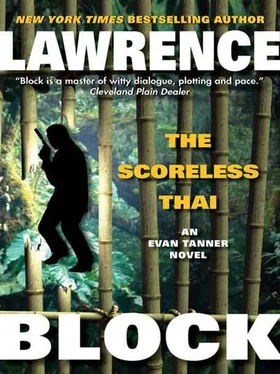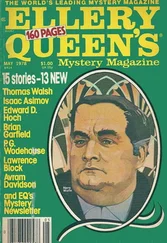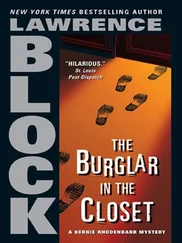The plane finished its third run, made another pass over the ship with the guns silent, evidently to assess the probable success of the mission. Then the pilot banked smartly, headed skyward, and flew away.
“Now he can go back to his base,” I said bitterly, “and he can paint a dugout canoe on the side of the fuselage. The son of a bitch!”
“Baby, I don’t get it. Why?”
“I don’t know,” I said. “Maybe-”
“Evan – the jewels!”
I swam back to the boat. The two leather bags of jewels were where we had left them, happily untouched by the bullets. But the boat was a lost cause entirely. I rescued the two jewel sacks and swam back to shore. A U.S. plane, I thought, disheartened. Just what we needed. With friends like him we didn’t need enemies.
“Why did that mother shoot us up, Evan? And what do we do now?”
The second question was unanswerable. But I had the first one figured out and suddenly I knew where we were.
“Those soldiers we saw around noon were speaking Annamese,” I said. “And they weren’t Laotian regulars looking for guerrillas, but it still would have been a bad idea to join them.”
“Why?”
“Because we’re in the middle of North Vietnam,” I said.
Dhang demanded a translation;once I had supplied it, he wanted an explanation. I told him the United States and North Vietnam were fighting, and that there were some guerrillas in South Vietnam called either the Vietcong or the National Liberation Front, depending who you listened to, who were fighting the government of South Vietnam. He asked how you could tell the North Vietnamese from the South Vietnamese, and I told him that you couldn’t, but that it didn’t really matter, because the leading strategists on both sides had evidently concluded that the only possible end to the confusion lay in killing everyone on both sides and everyone on neither side, as quickly as possible.
Then he asked another annoying question, one which Tuppence promptly echoed in English. “What do we do now, Evan?”
I didn’t answer either of them.
“We could surrender,” Tuppence suggested.
“To whom?”
“To the first people we meet. We’re lost and we don’t even have a goddamned boat. Suppose we just hit on the first cats we find and wave a white flag at them. What then?”
“They would take us to Hanoi and try us.”
“As what?”
“As war criminals. Or they might ship us back to the Pathet Lao. Or, most likely, they’d shoot us on the spot. I don’t think the North Vietnamese Army is too keen on taking prisoners behind their own lines. They haven’t had much experience at it except with captured pilots. With none of us speaking the language, they’d probably decide we weren’t worth the trouble.” I shook my head wearily. “Or else they’d figure out that we were part of an invading force operating in the north. Who knows? We might touch off an international incident. I wouldn’t mind that so much, but I have the feeling we wouldn’t survive the experience.”
“And don’t forget the jewels.”
“I’d love to forget the jewels.”
“You haven’t looked at them yet.”
“I don’t particularly want to look at them. I should have left them in the river. Now we can’t even chance surrendering to some peasants somewhere. They’d kill us for the jewels. You know, I’m not particularly ecstatic about our situation. I wish that goddamned river had led in some other direction.”
“How do we get out of North Vietnam?”
“I’m not all that certain that we do,” I said. “But I guess the only way to do it is by going to South Vietnam. Which, logically enough, is south of North Vietnam.”
“So if we keep going south-”
“We get killed,” I finished for her.
“Oh.”
“But we have to try it. I think we can forget about the river. We could conceivably cut wood for a raft and lash it together with vines, but I’m not sure it would work. And the river seems a little too exposed. If that idiot was willing to waste a few hundred bullets on a dugout canoe, he’d probably drop napalm on a raft.”
“If we don’t use the river, what then?”
“Cut through the jungle,” I said. “There’s something called the Ho Chi Minh Trail – according to the newspapers, it’s what the North Vietnamese soldiers use when they infiltrate into the south. I don’t suppose there are any road signs on it, but if we head over that way, away from the river, we ought to hit some sort of route heading south. We’ll have to travel by night, I’m afraid. We don’t want to meet anyone at all because there’s no one from here to the border we can count on as a friend. The local soldiers will be against us and so will the American planes. When they come over here, they shoot at anything that moves.”
“It doesn’t sound so groovy suddenly.”
“It sounds terrible to me. Dhang’s pretty good at jungles. If we follow his lead, we ought to do all right. We can sleep under cover during the day and move by night. I wish to hell we had the guns, or at least a couple of machetes. I’ve still got the dagger in my tunic, but I can’t see us slaughtering much game with it. Maybe we can pelt animals to death with the jewels.”
Tuppence looked closely at me. “You sound a little hysterical,” she said. “Is that fever coming back for a second round?”
“No,” I said. “I’m just hysterical.”
By nightfall we had lost sight of the river without encountering a jungle trail heading south. We had huddled together twice while bands of natives, presumably civilians, passed within a few yards of us. And Tuppence and I had found out what lizard tastes like. I had figured it would taste like chicken, like all those other things that no one in his right mind would put in his stomach. It didn’t. It tasted like salty rubber.
Walking cross-country in the darkness was about as much fun as stumbling up a downward-bound escalator. Dhang led the way, Tuppence followed, and I, loaded down with the two bags of jewels, brought up the rear. Tuppence kept falling down. If there was a root or vine anywhere in the neighborhood, she got a foot tangled in it and flopped on her face. After I picked her up for the twentieth time, I mentioned her great skill in jungle-jaunting.
“You ought to be better at this sort of thing,” I said. “Think of the days of your youth, hunting Simba in the vast jungles of your native Kenya.”
“Shee,” she said, “it. You ever been to Kenya, baby?”
“No.”
“ Nairobi is like a modern city. No jungles. Sidewalks and everything. Everything’s up to date in Nairobi.”
“Oh.”
“I would like to be there right now.”
“So would I,” I said, “and I’ve never even been there.”
“How much of this jungle do you figure there is?”
“Miles and miles.”
“That pins it down.”
“Well, just figure that there’s a lot of it.”
“There’s already been a lot of it.” She fell down again, and I helped her to her feet.
We reached a southbound trail a few hours later. It was a path about four feet wide, and it couldn’t have been the Ho Chi Minh Trail because it was far too narrow and overgrown to be used by a motorized column. I decided that this was just as well. We made much better time than we had when we were just stumbling blindly through the brush, but it was still very slow going. At this rate, I thought, we would spend months in the jungle. It would take us forever to reach the south.
We kept moving until daybreak. Dawn wasn’t really that much of an event, for relatively little light penetrated through the dense growth of vegetation overhead. There was a noticeable difference, though, enough to confirm my original idea that the daytime was a time for resting and hiding. We left the trail and made our way through the brush some thirty yards. Dhang and I cleared enough space for the three of us to stretch out. I think he found us something to eat, but I don’t remember what it was. We were too exhausted to have any particular interest in food. It was simply fuel.
Читать дальше












